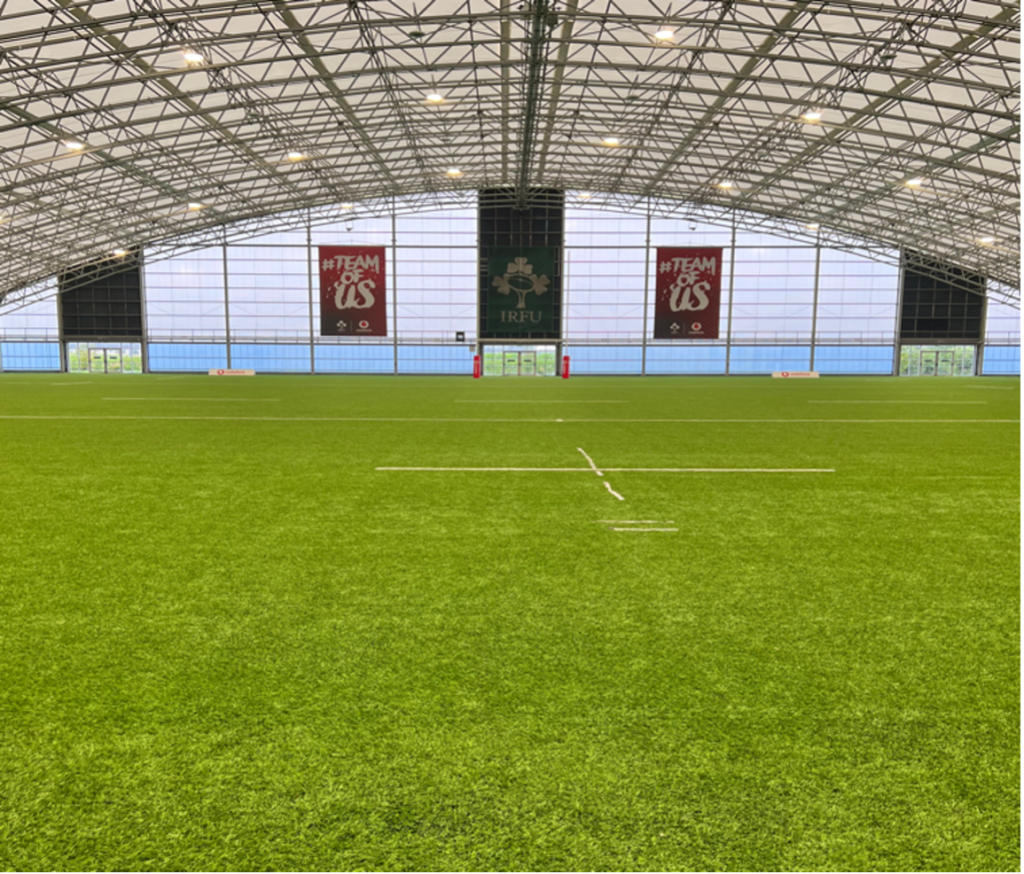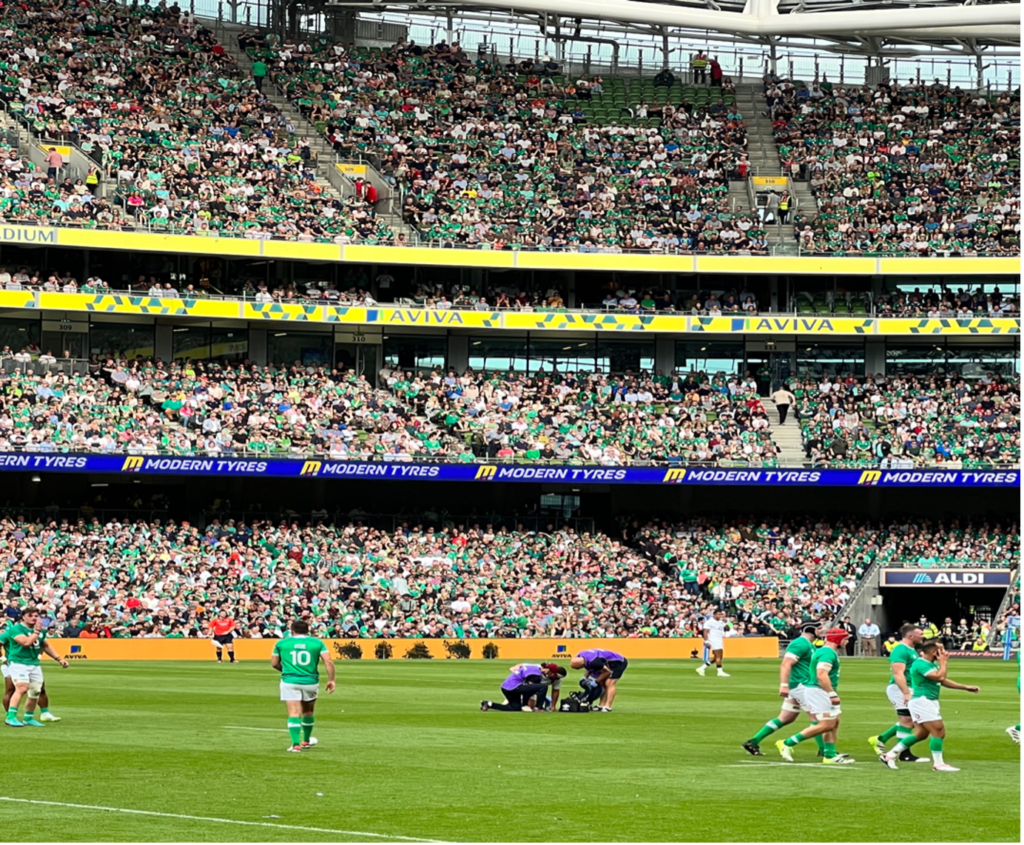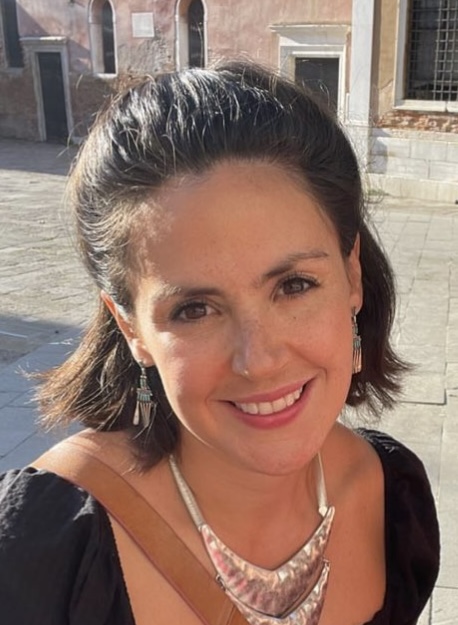Written by Caroline White
World cups are coming thick and fast in the sports world. Following the England women’s football success of reaching the final in Australia, attention now turns to the Men’s Rugby World Cup, which is being hosted slightly more locally in France in September.
Teams have been fine-tuning their squads in warm weather camps and friendlies. Unfortunately for some, it has ruled out several of their big stars with major injuries. France lost their star fly half- Romain Ntamack- to an ACL injury, and England replaced a scrum half Van Poortvliet following a significant ankle injury.
In August, I had the opportunity to catch up with friends/ex-colleagues from the Ireland and England teams to see how preparations were progressing and watch the match between the two nations at the Aviva Stadium in Dublin. I travelled with one of my old physio colleagues from Northampton Saints Rugby and friend Kiera Ruddy.

Left: Caroline White, Centre: Emma Gardner, Right: Kiera Ruddy
Much of Ireland’s preparations have been at their base at the IRFU high-performance centre in Dublin. We had the chance to walk about and explore their fantastic facilities with Órla Armstrong and Anne-Marie Mulholland, the Ireland Rugby lead 7s physio and nutritionist, respectively. Órla and Anne-Marie are busy with the 7s team preseason before they jet off to warmer climates to begin the World Sevens series later in the year in Dubai and Cape Town. The openness and positive environment is apparent from the offset, with a few of the senior men’s players doing some extras alongside their female 15s and 7s counterparts. We were joined at lunch by the performance director David Nucifora who has been leading IRFU for the last nine years. Discussing with him the IRFU strategy and his thought process behind the design of the IRFU high-performance centre. The flow between the indoor training pitches, the gym and the medical room creates a cohesive environment and allows players to transfer easily between the spaces but also encourages a team atmosphere, even if you are completing your rehab on your own in the gym while the players are next door training on the indoor pitch.

The high-performance centre indoor pitch
Later, we headed across the Ireland Team hotel to meet with Stephen Mutch, one of the senior team physios and chair for the Association of Chartered Physiotherapists in Sports Medicine (ACPSEM.) and Emma Gardner, Ireland Rugby’s head of nutrition and the men’s senior team nutritionist. We have been privileged to have Emma guest lecture with us at the University of Birmingham on the Exercise and Sports Medicine (Football) MSc. It was great to speak to them both about how they have been refining their processes over the last eighteen months in the lead-up to the World Cup. They were trialling certain aspects around managing the injured player to expedite their return in the 6 Nations earlier this year, which was successful.
On game day, we caught up with the England Rugby Physio staff Kate Davies and Bob Stewart, whom you’ll often see running onto the pitch in their purple bibs, patching players up. For years, Kate has worked for England Rugby across their pathway and senior teams. Knowing the majority of these players from when they first started within the England set up in the U18s teams. Kate is hopefully coming to the University of Birmingham to guest lecture on the Exercise and Sports Medicine MSc when she has had a well earned break post-World Cup. Bob joined the England senior team in 2016, having previously been my boss at Gloucester Rugby for several years. The England medical team face different challenges, with their players not being centrally contracted like the Irish players. The relationship with the players club is vital for both nations, but the decision-making process depends on where the player’s contract sits.

Kate Davies and Bob Stewart treating an injured player
It was a great two days filled with interesting CPD throughout and speaking to some of the leading practitioners in world Rugby as they near the end of their preparations ahead of the World Cup. It has certainly stimulated thoughts on what areas we want to expand on as part of our Exercise and Sports Medicine (Football) Masters here at the University of Birmingham to ensure students are being exposed to the forefront of Sports Medicine and what different sports can learn from one another across the interdisciplinary team.
The match kicked off at a packed Aviva Stadium, with some big battles on the pitch, plus a red card! But Ireland Rugby, tipped as one of the favourites for the World Cup, demonstrated their dominance in winning the match by a comfortable margin. If any of the last few World Cups we have had this year are to go, there will certainly be some interesting matches and a few surprise results.

C.S.White@bham.ac.uk

Congratulations Caroline,
An outstanding piece of work by you.
So many old friends and colleagues.